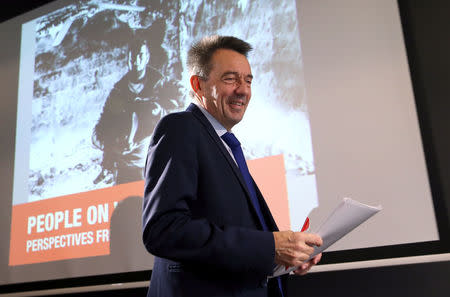Red Cross says survey shows alarming rise in acceptance of torture in war
By Lin Taylor LONDON (Thomson Reuters Foundation) - There has been an alarming rise in the acceptance of torture and civilian deaths during war, especially in countries at peace, the Red Cross said on Monday as it released a global survey of public views around war. More than a third of respondents in the study published by the International Committee of the Red Cross (ICRC) believed a captured enemy combatant could be tortured to obtain information. Just under half believed it was wrong to torture enemy fighters compared to two-thirds in a 1999 survey. "We all need to redraw a line in the sand: torture in any form is forbidden," ICRC President Peter Maurer said in a statement. "We demonize our enemies at our own peril. Even in war, everyone deserves to be treated humanely." But Maurer said it was clear from the survey that people did not believe in a "battlefield free for all". Two thirds of those who took part in the survey of 17,000 people in 16 countries believed the 1949 Geneva Conventions, which impose guidelines on how civilians and prisoners of war should be treated, were still relevant. The proportion was slightly higher in areas plagued by conflict. "In such troubled times, it's heartening to see that the vast majority of people believe that the laws of war matter," Maurer said. "This recognition of basic human values flies in the face of the appalling violations we see on a daily basis in our work." The countries surveyed included war-torn nations like Yemen, Afghanistan, Iraq and South Sudan, as well as the five permanent members of the U.N. Security Council - the United States, Russia, China, Britain and France. The survey indicated those in conflict-affected countries were more likely to respond humanely. Seventy eight percent of respondents in these countries said it was wrong to attack enemy combatants in populated areas, knowing that many civilians would be killed, compared to 36 percent in the United States. Almost 90 percent in conflict-affected countries thought it was wrong to attack hospitals, ambulances and health-care workers in order to weaken the enemy, compared to 76 percent in the United States. "If you listen to people who have experienced conflict ... they're the group that are saying that the laws of war are relevant and useful," said ICRC law and policy director Helen Durham. "We saw, not just cynicism, but a more hardened view by those countries not involved in armed conflict." Durham said there was also a growing disparity between governments and public opinion. The ICRC has documented hundreds of attacks against patients, health workers, medical facilities and ambulances in conflict-affected countries including Syria, Yemen, South Sudan and Afghanistan. In Yemen, 100 percent of respondents said it was wrong to target hospitals with 98 percent agreeing in Afghanistan "The disconnect between what people think and what the political leaders are actually doing is something that we really need to start raising," Durham said. (Editing by Emma Batha; Please credit the Thomson Reuters Foundation, the charitable arm of Thomson Reuters, which covers humanitarian news, women's rights, trafficking, corruption and climate change. Visit news.trust.org to see more stories.)




